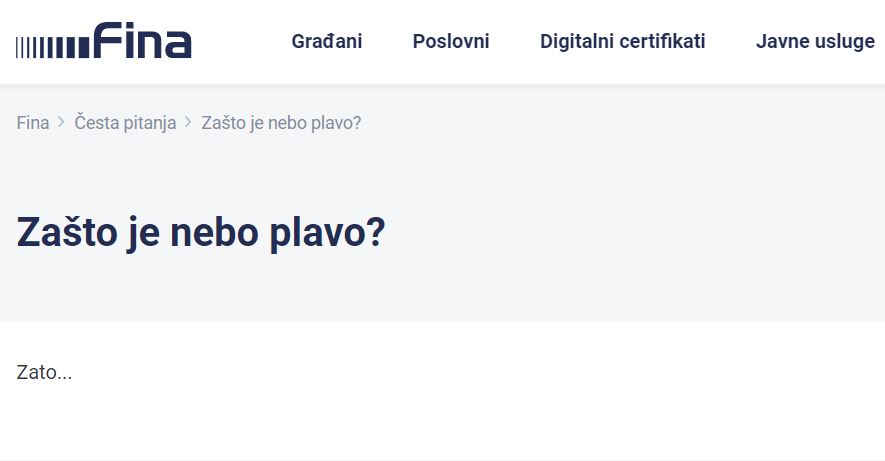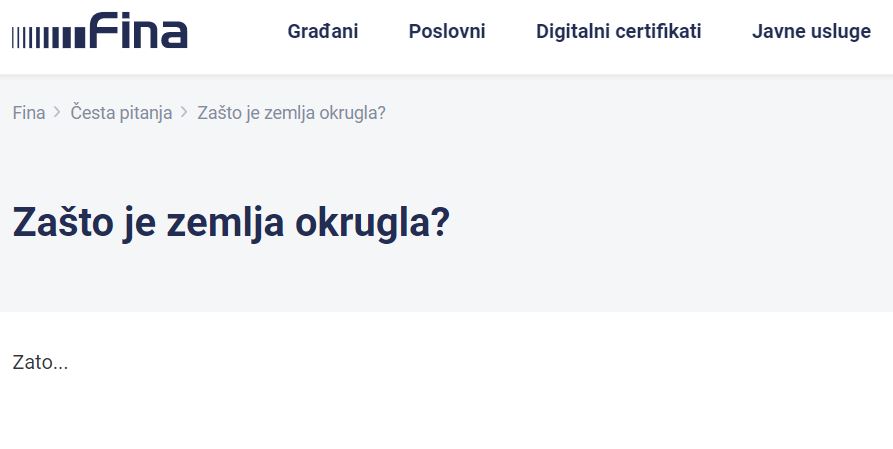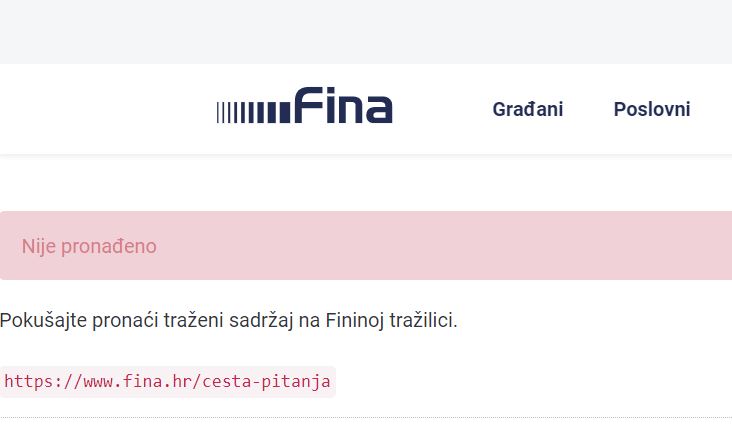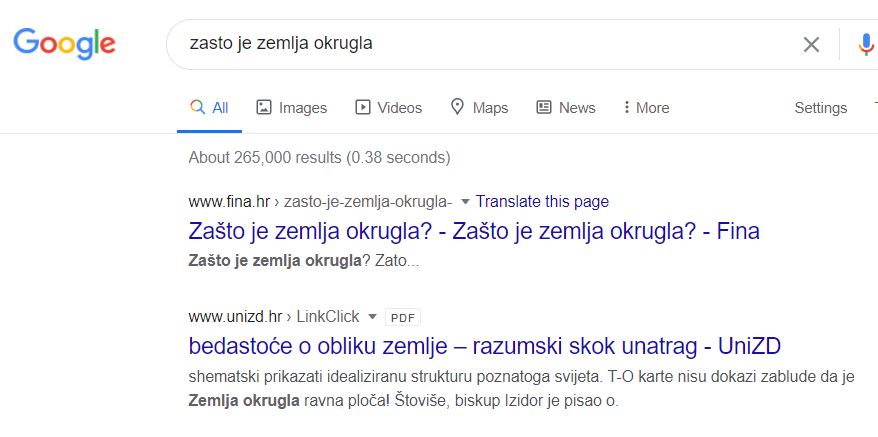Croatian Financial Agency FINA Explains Why Sky is Blue, Earth Round
January 7, 2021 - Official institutions are often accused of being costly and too bureaucratic. How the Croatian Financial Agency FINA is going the extra mile to educate people in the really important things in life.
It is not a lot of fun running a news portal at the moment. Earthquakes, pandemics, corruption, the events in Washington, and the usual joy of Croatian political infighting and name calling - there just isn't really much happiness or light relief.
At times such as these, I have found that one way to destress is to take a tour of the magical kingdom of the official Croatian website. Official Croatian websites are the gifts which keep on giving when you need a little boost in life. We, the peasants and Croatian taxpayers, pay handsomely for their existence, and I personally feel that they give excellent value for money.
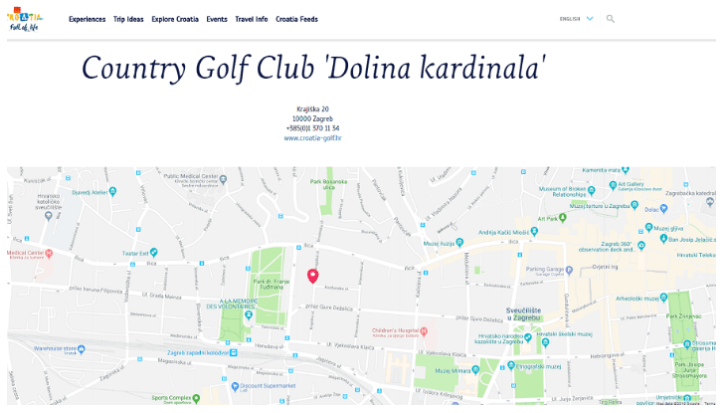
(Croatia.hr screenshot in 2018)
The Croatian National Tourist Board is one of my favourites, with their truly innovative approach to promoting the hidden gems of global tourism. Where else in the world can you find an 18-hole golf course in the middle of a residential area in the centre of a capital city, as our tourism heroes were promoting a couple of years ago? Fancy a round? Learn more in Tourism Quiz of the Summer: How Many Golf Courses Will Croatia Have Next Week?
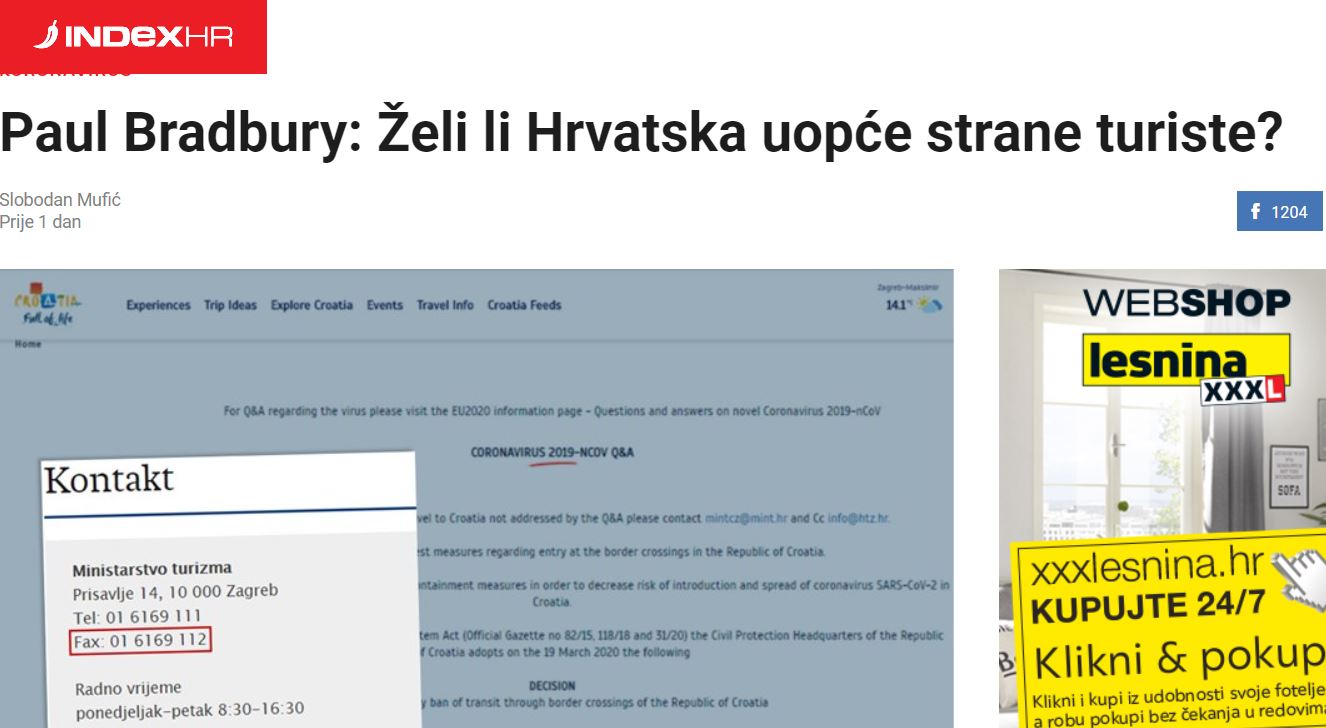
And if you are looking for comforting memories of your youth, look no further than the Ministry of Tourism, whose home page last year was celebrating that 2020 digital champion, the fax machine (but no email), a whole generation after most of its citizens had last used one.
(Screenshot of Croatian Ministry of Foreign Affairs homepage in English)
Not to be outdone - and worthy of an extra gold star and chocolate biscuit - the Croatian Ministry of Foreign Affairs continues to celebrate state of the art modern communications on its homepage in 2021. Not one, but TWO fax numbers to accompany the solitary phone number and email address. An outstanding use of taxpayers' money. Can you imagine the convenience in 2021 of having a spare faxing option should you find the first fax number busy?
Yesterday, I came across a new source of light relief from an official website, and one which is going the extra mile to provide additional services to its users.
I don't think I have ever frequented the website of FINA, the Croatian Financial Agency before, but it is seems that I - and more importantly, you - are really missing out.
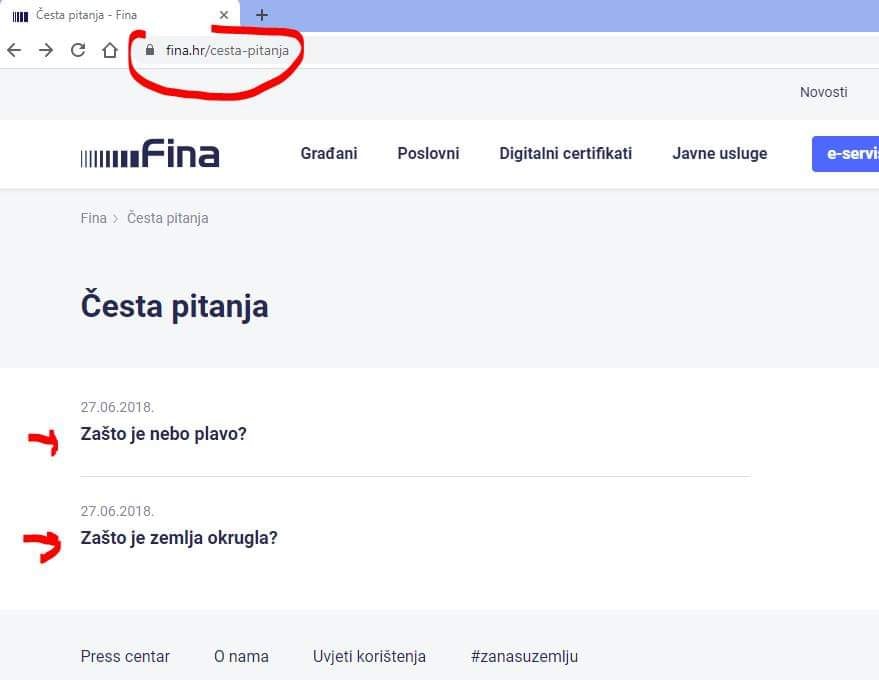
A friend sent me a link and encouraged me to check it out - FAQ (cesta pitanja) on the Croatian Financial Agency FINA website. I have to say that I didn't feel particularly inspired to click. What on earth could be so interesting about frequently asked questions on a Croatian financial agency website?
How wrong could I be?
FINA is clearly doing an outstanding job explaining the intricacies of the Croatian financial system, as there were only two questions on the FAQ page. I am not a financial expert, but I will confess to being a little surprised by the oft-asked questions.
(Screenshot from fina.hr)
Why is the sky blue?
Why is the Earth round?
Weighty topics, and one which some institutions would go into great detail to explain. But not our efficient Croatian Financial Agency, which clearly understands that time is money, managing to succinctly answer both demanding questions with just one - indeed, the very same - word:
'Zato...' - just because...
Impressive stuff, and sound financial insights that FINA has been selflessly delivering since 2018, apparently.
Sadly - presumably due to budget cuts - this essential public service is seemingly no longer available. Inexplicably, after these explanations about the blueness of the sky and the roundness of Mother Earth did the rounds on social media, the page was removed from the FINA website yesterday. Perhaps it was a conspiracy from the Flat Earthers trying to quash propaganda, it is not quite clear.
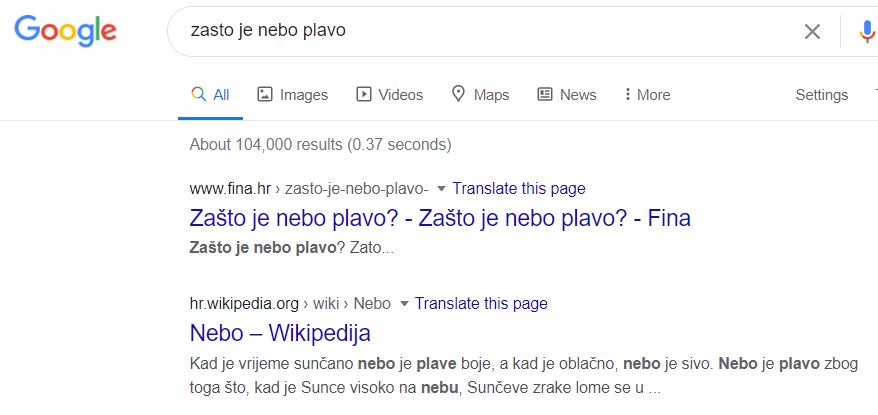
But the good news for us, the peasant taxpayers, is that all is not lost, and our tax dollars have been well-invested in a Google legacy. It seems FINA has demonstrated some commendable SEO skills, easily beating the likes of Wikipedia in the important Croatian-language search terms for 'why is the sky blue' and 'why is the earth round.'
So the next time you object to those high taxes, take a moment to consider the additional value being provided on your behalf before you judge.
I am not an expert on FINA, but I know a man who is very passionate about it, and I reached out to him for comment. Political guru, digital champion and all-round Croatian brainbox, Marko Rakar, kindly spared a few moments from his busy schedule doing whatever he does in that black office of his to offer the following thoughts:
"Foreigners have real trouble grasping the meaning of FINA since there is nothing like it anywhere in the modern world. It is basically a government-imposed middleman, in reality a cancerous tissue on our economy, which uses its administrative monopoly to collect about 1 billion kuna in various fees without providing a single useful and/or market competitive or necessary service. It is estimated that they alone can account for about 1% of lost GDP (for every single year of their existence).
"Yet, in order to justify its existence, this zombie life-sucking institution tries to influence or meddle in just about any remotely financial activity while demonstrating gross incompetence overall inefficiency. They do it spontaneously, without a plan, strategy or even tactics, so it is no surprise that they have now moved into deeply philosophical subjects such as why the sky is blue or why the earth is round. It could be fun to ask them how much they charged Croatian taxpayers to answer these self-evident questions."
If you have any inspirational gems from the magical kingdom of official Croatian websites that you feel should be brought to the attention of those funding them, contact This email address is being protected from spambots. You need JavaScript enabled to view it. Subject Genius.
Evacuation of Petrinja Centre Discussed after Latest Earthquake
ZAGREB, 7 January, 2021 - Wednesday's evening tremor measuring 5.0 on the Richter scale caused additional damage on buildings in Petrinja, and later in the night the police banned people entering the centre of the town.
The spokesman for the task force dealing with the aftermath of the 29 December earthquake, Mladen Pavic, said on Wednesday evening that the quake rubble would soon be removed from a road between Petrinja and Glina to enable the resumption of traffic.
The spokesman said that more information about the extent of the damage would be known on Thursday morning.
There were no reports on casualties.
Petrinja Mayor Darinko Dumbovic said on Wednesday evening that all activities should be dislocated from the centre of the town and did not rule out the evacuation of that part of Petrinja.
The mayor told the NOVA TV broadcaster that staying in the centre poses a big risk for everybody.
"I am afraid that tremors can make us insane, and all that requires great responsibility for making tough decisions," Dumbovic said in his comment on frequent aftershocks since the 29 December magnitude 6.2 earthquake which took seven lives and caused huge damage in Sisak-Moslavina County.
The spokesman Pavic said that the local population was scared, and after the latest tremor some inhabitants decided to spend night in tents.
He added on late Wednesday night that the situation was slowly calming down.
Croatia's Seismological Survey registered an earthquake at 6.01 p.m. on Wednesday measuring 5.0 on the Richter scale with the epicentre near Petrinja, 45 km southeast of Zagreb.
The tremor was felt in central Croatia, including in the capital.
For more on the Petrinja earthquake and to see how you can donate money, food, humanitarian, sanitary, and material aid, follow our dedicated section.
Croatia Condemns US Unrest, Peaceful Transition of Power Most Important
ZAGREB, January 7, 2021 - Croatian Foreign Minister Gordan Grlic Radman on Wednesday reacted on Twitter to the unrest at the United States Capitol and underscored that "upholding democratic institutions and peaceful transition of power is of utmost importance."
The minister said on Twitter that he was "following with great concern the events in Washington DC".
A crowd of supporters of President Donald Trump stormed the building of the Capitol, the seat of American democracy, in an attempt to overturn the election results and stop a Congress session which was supposed to certify the victory of Democratic President-elect Joe Biden. Police retaliated by drawing weapons and shooting tear gas.
In the meantime, police officers in full riot gear began to pull away Trump supporters from the Capitol.
Following with great concern the events in #WashingtonDC.
— Gordan Grlić Radman (@grlicradman) January 6, 2021
Upholding democratic institutions and peaceful transition of power is of utmost importance.
For more on politics in Croatia, follow the dedicated TCN section.
Liverpool Fans Rally Around Petrinja Earthquake Victim for Saving 'This is Anfield' Sign
January 7, 2021 - Petrinja earthquake victim and Liverpool supporter Bruno Lončarević is in the international spotlight for recovering one special memento from his damaged apartment. A 'This is Anfield' sign.
Index.hr reports that the story of Bruno Lončarević, a radiologist from Petrinja and a faithful Liverpool fan, whose family was left homeless in the earthquake, has spread far beyond Croatian borders.
It was not only broadcast by Liverpool fan media but also by the masses like the Daily Star. Liverpool fans' associations from the Balkans and around the world joined a fundraising campaign - and the news even reached former Liverpool player Dejan Lovren.
Lončarević is a radiological engineer who has been working at the Zagreb Clinic for Infectious Diseases "Dr. Fran Mihaljević" for almost a year and has thus been on the frontlines in the fight against COVID-19. His apartment was destroyed in the Petrinja earthquake last week, from which he only saved some clothes and fan props of his beloved Liverpool, a plaque with the coat of arms and the inscription "This is Anfield," which stands at the exit of the tunnel leading to the pitch of the cult football stadium.Liverpool fans rally round struggling Covid-19 doctor after Croatian earthquake | #LFChttps://t.co/VLONG7gFAB
— Daily Star Sport (@DailyStar_Sport) January 6, 2021
"After the earthquake, all I could think about was how I was going to get into the apartment, take some clothes and this sign that was in a special place in the apartment," Lončarević said for RTL.
Thus, the official association of Croatian Liverpool fans launched a fundraising campaign and opened an account to raise money for Bruno.
"Everything just needs to be resolved from the accounting side," said Antonio Krizmanić from the Official Liverpool Supporters Club Croatia fan association. He and Edin Tanević, another Liverpool fan, are leading the initiative.
"Edin, with the help of Nike Fleiss, legally received a video from RTL, which we subtitled in English, and tomorrow we will send it to e-mails, social networks, and directly to the club.
We did not want to send it until everything was ready to receive donations from abroad, but two groups from the Balkans, Italy, and Turkey, joined the action. We are in contact with the club via intranet, which connects all fan associations worldwide. We asked them for a signed jersey that we would put up for auction, but they already had a lot of such requests due to the pandemic, so they said they had to consider the request," Krizmanić said.
"His family's house was destroyed by the first earthquake. He was just preparing his Petrinja apartment for renovation, for which he had just taken out a loan, and then it was destroyed by an earthquake the next day. By the end of the week, he and his family were accommodated in an apartment in Zagreb. Still, they had already received a lot of offers for the future and accepted one from their close family friend, so they will live in their apartment in Zagreb for free for the next year," he explained.
The association has already contacted former Croatian Liverpool players Igor Bišćan and Dejan Lovren, who, immediately after the earthquake joined in to help the victims. Lovren even offered his hotel in Novalja to affected families.
"He reportedly heard the story while serving lunch in Novalja. He knows about Bruno's situation, but he has a lot of calls currently," said Krizmanić, adding that Bruno is shy about the media attention.
"He's a really good guy; I'd say too modest. He didn't want this to go that far, but look, buddy, it's Liverpool."
For more on the Petrinja earthquake and to see how you can donate money, food, humanitarian, sanitary, and material aid, follow our dedicated section.
Flights to Croatia: Qatar Airways Reduces Traffic to Zagreb, Again
January 7, 2021 - The latest news for flights to Croatia as Qatar Airways reduces traffic to Zagreb.
Croatian Aviation reports that Qatar Airways has updated its flight schedule on the Doha - Zagreb - Doha route. The airline has further reduced the number of weekly flights on its only route to Croatia.
Namely, Qatar Airways has made changes to its flight schedule for the rest of the winter and the start of the regular flight schedule.
This airline had announced an increase in the number of weekly flights to Zagreb during the Christmas and New Year holidays, launching the second weekly flight on this route. Due to weak demand, they were not realized, so they continue to operate on the Zagreb line only once a week, every Friday.
Qatar Airways currently does not have the capacity to fill its smallest aircraft in the fleet (A320) to Zagreb, all due to the impact of the global pandemic and passenger restrictions between countries.
Until a few days ago, the airline offered two daily flights to Zagreb from the end of March, which is actually the schedule that existed before the global pandemic and has not changed so far.
These two daily flights are no longer available for booking on the airline's website. Instead of twice a day, the airline plans to operate twice a week (Tuesdays and Saturdays) between Zagreb and Doha, from the end of March to the end of May 2021.
As of June, two daily flights are available. Still, it is expected that the airline will withdraw these flights from sale in the coming weeks and reduce the frequency to two to three flights a week, depending on the epidemiological situation and the demand itself.
In January and February 2020, before the outbreak of the global pandemic, Qatar Airways flew to Zagreb twice a day on A320 aircraft and offered over 31,000 seats between Doha and Zagreb in those two months. In January and February this year, Qatar is offering just one weekly flight (Fridays) for a total of just over 2,100 seats. This is a drastic reduction in the available seats on this line by as much as 93%.
The small number of weekly Qatar Airways flights is not a surprise - the line to Zagreb has been used by many tourists from all over Asia, Australia, and Oceania. There are almost no such passengers in Croatia since the outbreak of the pandemic. The line from Zagreb is also used by a large number of Slovenian citizens who do not have a direct line from Qatar Airways from Ljubljana. Still, at the moment, Slovenian citizens also do not travel in large numbers, so we will have to wait for a slightly larger number of weekly flights.
In February 2020, Qatar Airways planned to increase capacity on its afternoon flights to Zagreb and operate a B787-8 wide-body aircraft (254 instead of 132 seats) instead of the narrow-body A320, but this did not happen due to the global pandemic.
Before the pandemic, the airline also announced the introduction of the seasonal line Doha - Dubrovnik - Doha, which is currently not on sale for the summer flight schedule in 2021.
For the latest travel info, bookmark our main travel info article, which is updated daily.
Read the Croatian Travel Update in your language - now available in 24 languages.
Several Buildings Damaged, No Reports of Victims in New January 6 Tremor
ZAGREB, 6 January, 2021 - Several buildings have been damaged in the magnitude 5 earthquake that rocked the Petrinja area on Wednesday evening, teams are inspecting the area and there is no information about victims as yet, the earthquake task force spokesman Mladen Pavic said.
Speaking to Hina, he said further damage to buildings damaged in last Tuesday's 6.2 tremor was to be expected given the magnitude and 10-second duration of today's quake.
Medved: Teams are on the ground again
After tonight's tremor, the head of earthquake task force, Tomo Medved, tweeted that all teams were on the ground again "to check if anyone has been injured and what the new damage is. Unfortunately, this also means that structural engineers must again inspect the buildings they have already inspected."
Seismologist Tomislav Fiket told Croatian Television tonight's tremor was one of the aftershocks of the "devastating earthquake of 29 December."
Croatia's Seismological Survey registered an earthquake at 6.01 p.m. today measuring 5.0 on the Richter scale with the epicentre near Petrinja.
The tremor was felt in central Croatia, including in the capital.
For more on the Petrinja earthquake and to see how you can donate money, food, humanitarian, sanitary, and material aid, follow our dedicated section.
December Earthquake Damaged over 22,000 Buildings in Sisak-Moslavina County
ZAGREB, 6 January, 2021 - Damage has been reported to date to more than 22,000 buildings in Sisak-Moslavina County after last week's earthquake and 20% of the 8,743 buildings inspected are completely destroyed, prefect Ivo Zinic said on Wednesday.
Speaking to the press in Sisak, he said 116,000 people were directly affected by the earthquake and 66,000 by the damage.
Of 56 schools inspected, 23 are usable, ten are partly usable, 12 are temporarily unusable, and nine totally unusable.
Damage has been reported to 3,000 family farms, 750 trades businesses and over 800 firms. The damage to state roads amounts to HRK 55 million and to county roads to HRK 23 million.
Zinic said 4,000 meals were being prepared daily at various locations.
He said the situation was under control but that the initial donations had been almost exhausted, so reserves would have to be restocked. The biggest shortage is for durable food. This situation, he said, is expected to last at least two to three months.
Zinic said 753 persons had been accommodated in sports halls, the local barracks, the Serif company in Glina, and in tents. He said 300 caravans, container and mobile homes had been set up, adding that there were 783 requests for them and that it was assumed over 1,000 would be necessary.
Zinic said five county construction teams, five psychosocial teams and three agricultural teams had visited 350 households and that the intention was for them to visit every household.
Asked about accountability for alleged oversights in the post-war reconstruction of homes, he invited the authorities to investigate and that the possible culprits be held to account.
County police commissioner Luka Pesut said the police had visited all citizens affected by the earthquakes.
For more on the Petrinja earthquake and to see how you can donate money, food, humanitarian, sanitary, and material aid, follow our dedicated section.
Another 5.0 Earthquake Near Petrinja (January 6, 18:05)
January 6, 2021 - Another earthquake has struck near Petrinja, this time 5.5, reports EMSC.
Initial reports suggest that the earthquake struck 45 km south-east of Zagreb, where it was also felt quite strongly. EMSC is reporting initially that the quake had a magnitude of 5.5.
Felt #earthquake (#potres) M5.5 strikes 45 km SE of Zagreb - Centar (#Croatia) 4 min ago. Please report to: https://t.co/iRiGPhu6Bj pic.twitter.com/s8BDzyFSC8
— EMSC (@LastQuake) January 6, 2021
Our thoughts are with local people and the many volunteers working so hard to alleviate the suffering from the December 29 quake.
For the latest information on the earthquakes, follow the dedicated TCN section.
18:24 update - the official Croatian seismology service is reporting the magnitude as 5.0.
#potres (#earthquake) 06.01. u 18:01 kod Petrinje, M5.0. Opširnije na https://t.co/3gUWsqxnDt. Ako ste osjetili potres, molimo javite na https://t.co/RJDaIJlwpM
— Seizmološka služba HR (@seizmo_hr) January 6, 2021
Early reports suggest that the quake was longer than the others, around 10 seconds.
EMSC is also now reporting a quake of 5.0, not 5.5.
The epicentre was near the village of Strasnik, 9km south-west of Petrinja.
M5.0 #earthquake (#potres) strikes 49 km SE of Zagreb - Centar (#Croatia) 15 min ago. Updated map of its effects: pic.twitter.com/5dyRICKXhp
— EMSC (@LastQuake) January 6, 2021
Skoro Says Civil Protection, Commodity Stockpiles Failed after Earthquake
ZAGREB, 6 January, 2021 - Homeland Movement president Miroslav Skoro said on Wednesday the system of civil protection and commodity stockpiles had failed in managing the disaster in Sisak-Moslavina County after last week's earthquake because the people in question were not qualified but party members "doing their job badly."
Speaking to the press while touring the opposition party's donation warehouse in Odra Sisacka, the deputy parliament speaker said the state should have replenished the commodity stockpiles because all available containers had been given to healthcare because of the COVID-19 crisis and to accommodate the people of Zagreb after the March earthquake.
Skoro visited the people affected by the tremor in the Banovina region, saying his party had done its utmost to help them.
He said the volunteers and citizens who came to help of their own accord had shown their big heart once again and that they could act faster and better than any institution.
He said it took the government six days to declare a state of disaster, "while football supporters, people of good heart who were here the next morning were, unfortunately, proclaimed as those disrupting some system and being a nuisance."
Skoro went on to say that Stjepo Bartulica would be the Homeland Movement's new whip.
He regretted that Karolina Vidovic Kristo and Milan Vrkljan left the party's parliamentary group, which now has ten deputies. "We have the impression it was all staged but it's their decision and we won't cry after anyone," he said, adding that he was convinced Vidovic Kristo and Vrkljan would trade with their seats.
Asked if they were forced out of the party as they claimed, Skoro said Vrkljan had been highly positioned in the party, its whip and a man he fully trusted. As for Vidovic Kristo, he said she had been an independent in the party's caucus.
He said there was no rift within the Homeland Movement.
The party's organisation secretary Darijo Zepina said the Homeland Movement had collected over 800 tonnes of food and necessities for the quake victims, adding that over 100 of its volunteers were visiting those in need every day and that it expected 30 trucks with relief from Germany from people who, he said, insisted that it be distributed by the Homeland Movement.
For more on the Petrinja earthquake and to see how you can donate money, food, humanitarian, sanitary, and material aid, follow our dedicated section.
Croatian Radiotelevision Story from 1998 Tells the Tale of Reconstruction of Strašnik
January 6, 2021 – A Facebook post started making the rounds in Croatia today, where archival footage from the village of Strašnik in 1998 is shown, where the concerns about the quality of the construction work after the Homeland war is questioned.
You can see the video in question below:
The video is from an extremely popular Croatian Radiotelevision show called “The Fruits of the Land” (Plodovi zemlje), which is the longest-running TV show on national television – it has been continuously broadcast since 1958. In the Nineties, the show was hosted by the extremely popular host Ivo Lončar, who has since passed away, but who produced the segment in question.
In the introduction to the segment, we are briefly told the story of Strašnik village, which is a village most people in Croatia had not really heard of before December 29th, 2020, when it was the epicentre of the disastrous earthquake. During the Homeland war of the early Nineties in Croatia, the occupying forces burned most of the homes in the village and forced the (mostly Croatian) people living there to flee their homes. After the success of Operation Storm in August of 1995, and in the spring of 1996, the return of the villagers began. Unfortunately, Ivo Lončar says in the piece, the return was not as efficient as was promised to them – as evidenced by the fact that out of the 400 people living in the village before 1991, only about a hundred of them returned before 1998, when the segment was produced. Before the war, most of those 400 people lived mostly off the land, most of them had cows and sold milk.
The people of Strašnik told the story of the state-funded and managed project of the reconstruction of their homes, stressing that the project started off on the wrong foot. The construction work itself was performed by the Krs company (the segment says it’s from Zagreb, but other sources say that the company was from Osijek), and the oversight was performed by the Sirać company. Back in 1998, when the segment was made, the people of the village told the reporter that the quality of the work performed was extremely low, This was at the moment when more than 70% of the houses in the village has been completed. 30 percent of the homes were never rebuilt, and the electricity was re-installed in the village in 1998, two years after the beginning of the project.
The people of the village publicly accused the head engineer, who led the project of rebuilding the homes in Strašnik, of open corruption. A villager (Stjepan Prašnjak from the local administration) explains to the reporter that they had come in contact with him personally and tried explaining to him that many odd things were happening during the construction phase, including the example in which the entire foundation of a house was built using 5 sacks of concrete. The same person also told the story of a villager who had returned to their home, went to sleep during the night and was awakened by the sounds of something breaking, crashing, only to discover that his chimney was crashing down!
Mr. Prašnjak then explained that the people of the village had tried complaining to numerous instances, both on the local, county level, and also on the national level through the Ministry in charge of the reconstruction of Croatia after the war. The replies they received were mostly that the problems will be fixed on the field, and that the company performing the construction work would have to foot the bill for any irregularities. Back in 1998, he added that nothing has been done to fix any problems.
The reporter continued to explain that the low-quality materials were used in the construction (concrete, brick, iron, roofing tiles), and the work performed was also bad. To prove the inferior quality of the work, the fact that in the first winter after the work was completed, in 1996, when the first snow came, 5 or 6 chimneys came down on their own, plaster started coming down on various houses etc. The windows and the doors were of very low quality, as well as plumbing and electricity installations. Ivo Lončar said outright that the reconstruction of the houses was plagued by the smuggling of the construction materials. Stjepan Prašnjak adds that the person who was in the village representing the company took bribes from the villagers, stating that there are witnesses who can corroborate that.
Most of the houses and the outbuildings were reconstructed by the villagers themselves, who invested their own funds into that. They felt bitter that they weren’t supported by the state more in that. The segment continued to explain the economic situation in the village, where there was only one tractor in 1998, and they were not given any financial support for the planting season.
Ivica Perković from the village told the story of his return to the village, which took place in 1998. First of all, he complained about the state of his house and said that it was impossible to return if you don’t have a house. He continued to say that both the speed and the quality of the reconstruction was not satisfactory. To prove his point, he stated that the works on his house had started in 1996, and that they were still not finished in 1998. He had complained about that fact to the Ministry, who responded to his complaints, but nothing had changed. He then explained that he had 5 cows, which he got milk from for sale, and some pigs, and that agriculture was the only way to make their living in the village.
Nikola Starešinović from the village told his story later in the segment, where he explained how, after his house had been rebuilt, it was discovered that the foundation of his new home had not been done properly. The foundation of his house was crumbling away (you can see that yourself around the 9:30 mark of the segment). He had complained about that to the institutions in charge, and the overseer came to his house and issued the recommendation of what needed to be done to fix the problem – and it was never done! He explained that he had no idea who else to complain to, to have his house fixed properly. He then continued to explain his life as a new farmer in the region.
Josip Šubić told the example of a house which had supposedly been reconstructed, where the water installations and the water heater had been installed, while at the same time the house didn’t have the doors or the windows. He added that when the people in charge of the oversight arrive in the village, they kept saying that the work is doing great.
The segment finishes on a very pessimistic note, with a villager saying that he regretted returning to the village and that he understood why young people were not coming back. The other one explained how and why people of the village were disappointed. Ivica Perković tried to give an optimistic view of the situation, saying that he loved the village and that more and more people were returning to it.
Ivo Lončar concluded the segment by stating that the reconstruction in Strašnik was officially finished, that the workers and the machinery had left the village. What remained were unfinished houses, even those finished are of low quality, people were sad and disappointed, the outhouses were never built by the state, there is no production of anything in the village, and he asks for how much longer the people of Strašnik need to suffer.
In 2021, the only thing we can say is – unfortunately, their suffering is far from over.
For more on the Petrinja earthquake and to see how you can donate money, food, humanitarian, sanitary, and material aid, follow our dedicated section.



